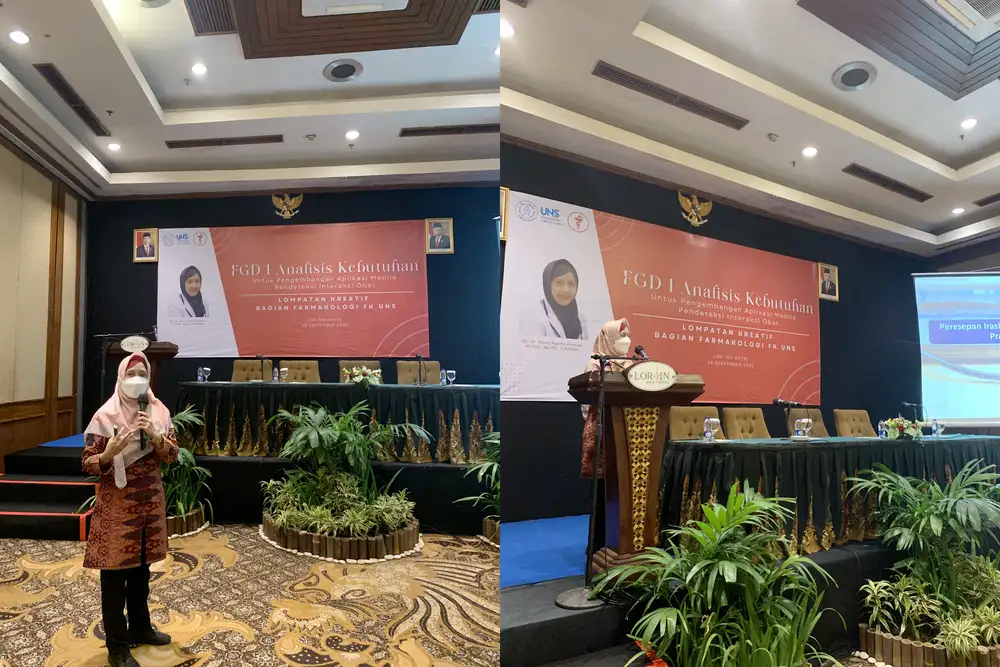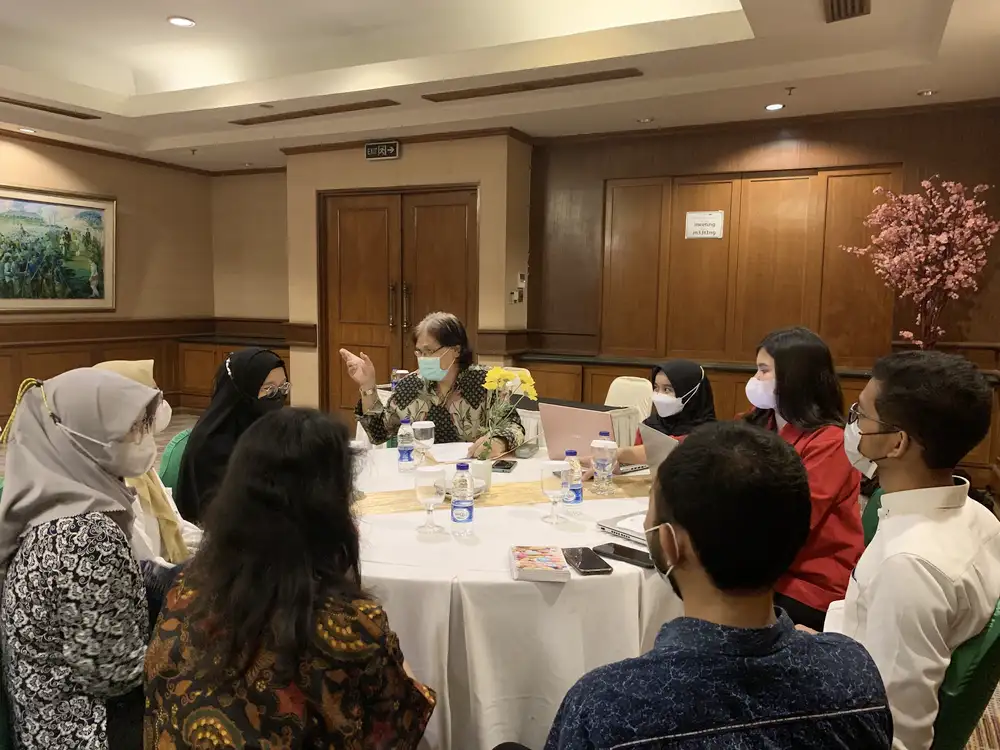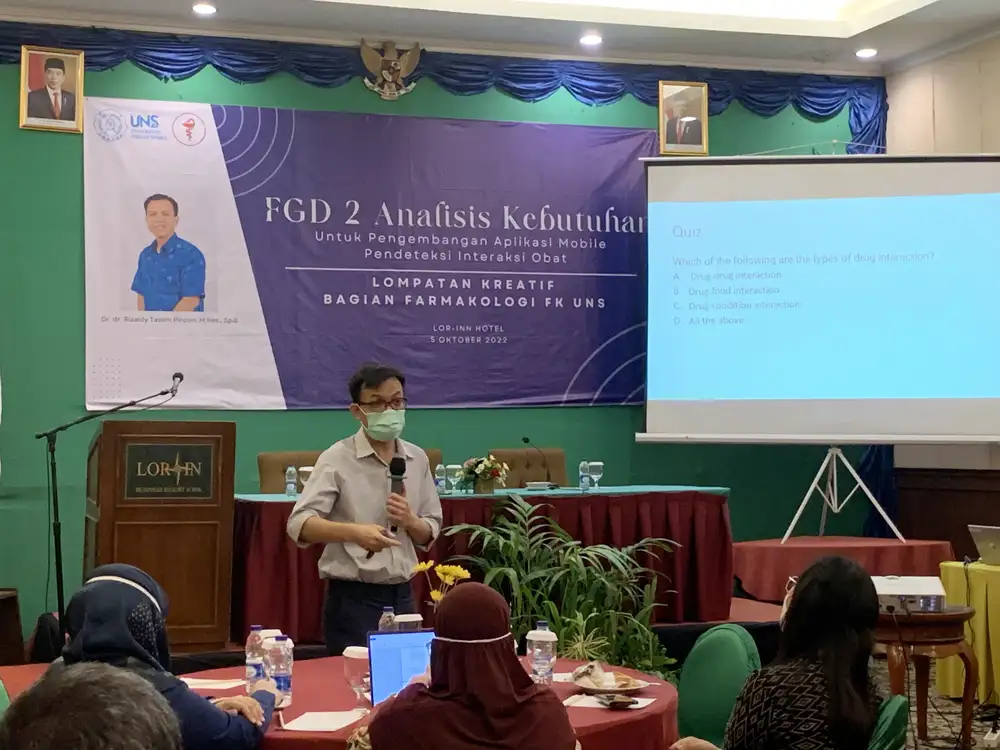Pharmacology Unit of FK UNS Holds FGD Activities in Developing a Mobile Application for Drug Interaction Detection

The Pharmacology Unit of the Faculty of Medicine (FK) Universitas Sebelas Maret (UNS) held a Focus Group Discussion (FGD) in the context of developing a mobile application (m-app) for Drug Interaction Detection (PIO) in Indonesian. The PIO m-app project is funded from the UNS 2022 Creative Leap Grant Program.
This FGD activity was divided into 2 stages. The first stage was held on Wednesday (28/09/22) at Puri Kencono Lorin Hotel Solo which was attended by various pharmaceutical elements in Solo Raya, including clinical pharmacists, community pharmacists, pharmacy lecturers, students of the Pharmacist Profession Study Program, representatives of the Indonesian Pharmacists Association (IAI), and clinical nurses. The second stage was held on Wednesday (05/10/22) at the Grand Rukmi Lorin Hotel Solo which was attended by clinicians from specialist doctors, general practitioners, medical lecturers, and young doctors at UNS pharmacy station.
Phase 1 FGD presented Dr. dr. Woro Rukmi Pratiwi, MKes, SpPD, FINASIM from the Department of Pharmacology & Therapy, Faculty of Medicine, Public Health and Nursing Universitas Gadjah Mada (FKKMK UGM) as a speaker. Dr. Woro delivered material on polypharmacy, irrational prescribing and monitoring in clinical practice.

The Phase 1 FGD activity was opened by Dr. dr. Selfi Handayani, MKes, as Vice Dean for Planning, Cooperation, Business and Information at FK UNS. Dr. Selfi in his speech really appreciated this activity. It was explained that through the Creative Leap Grant scheme, UNS strongly supports innovative efforts that encourage the achievement of the main performance index (IKU), especially for aspects of internationalization, revenue generating products, and student internships. For 2022, as many as 6 (six) proposals from the FK successfully passed with a total funding of 2 billion rupiah.
Dr. Nur Hafidha Hikmayani, MClinEpid, PhD, as the head of the event organizer, added that the Phase 1 FGD is one of a series of activities in the PIO m-app development project. Other planned activities include sending teaching staff to take certified courses on pharmacovigilance, organizing international guest lecture webinar series and workshops for application development teams.

Material session by Dr. Woro was fun and interactive, especially when real examples of inappropriate prescribing practices in clinical practice, both manual and digital prescribing (e-prescribing) were shown. Regarding the issue of polypharmacy, he explained that not all polypharmacy practices always have a negative effect, some even deliberately take a positive effect. But he also underlined that the potential for interactions between drugs should ideally always be checked.

In the FGD Session 1, participants showed very high enthusiasm by sharing their experiences in using the English language PIO website or application while on duty according to their respective roles. Almost all clinical pharmacists, especially in the inpatient department, routinely check polypharmacy prescriptions and drugs with a narrow therapeutic window. In the academic sphere, polypharmacy and drug interactions are materials that are always included in the pharmacy curriculum and include those tested in the OSCE at the professional stage. Participants' criticisms, obstacles and suggestions while using the available PIO application have become very valuable input in the development of the PIO m-app by the Pharmacology Section of FK UNS. The plan for the presence of the Indonesian language PIO m-app adapted to the clinical context in Indonesia – which will later be named SMAtDIO – was very well received by the participants. They really hope that the SmartDIO application can be realized and launched in the marketplace so that it can support the needs of health workers and educators at work. The FGD program which was guided by the lecturers of the Pharmacology Section lasted for approximately 1 hour. Dr. dr. Setyo Sri Raharjo, MKes as the Head of the Pharmacology Section of FK UNS gave the conclusion of the FGD results and closed the event.
Next, The FGD Session 2 activity was opened by Dr. dr. Setyo Sri Rahardjo, M.Kes as Head of the Pharmacology Section of FK UNS.


Before the presentation of the material began, dr. Nur Hafidha Hikmayani, M.Clin.Epid., Ph.D as the head of the event organizer, explained briefly about the PIO m-App project which is being developed by the Pharmacology Section of the UNS FK in collaboration with the Informatics Engineering Study Program of the Vocational School UNS.

In the material session, Dr. Rizaldy discussed drug interactions, electronic prescribing in clinical practice, and the role of digitalization in minimizing the risk of drug interactions. In his clinical practice, Dr. Rizaldy provides an overview of real examples of electronic prescribing and alert systems for drug interactions. He reminded that potential drug interactions are not always detrimental or contraindicated so that the role of digitization becomes very important for clinicians in clinical decision support systems and minimizes errors.

In the core activity in the form of a group FGD guided by lecturers from the Pharmacology Section for approximately 1 hour, participants showed high enthusiasm by sharing their experiences in using the English language PIO website or application while on duty according to their respective roles. Discussion participants agreed on the need for PIO applications in clinical practice as a tool to improve patient safety and service efficiency. In addition, in the academic sphere, the PIO application can be one of the media in supporting professional learning, especially to help hone students' skills in terms of proper and safe prescribing. The event was then closed with a summary of the results of the FGD by Dr. dr. Setyo Sri Raharjo, M.Kes.
In line with the Phase 1 FGD which was held a week earlier, the Phase 2 FGD participants also enthusiastically welcomed the development of the Indonesian language PIO m-app by the Pharmacology Section of the FK UNS. The developed car application will later be adapted to the clinical context in Indonesia and will be named SMAtDIO. Experiences, criticisms, and suggestions that have been conveyed during the Phase 2 FGD activities will be very valuable inputs in the development of the SMAtDIO m-app.

Reporter: Muh. Abu Dawud
Editor: Wartini
 bahasa indonesia
bahasa indonesia 



